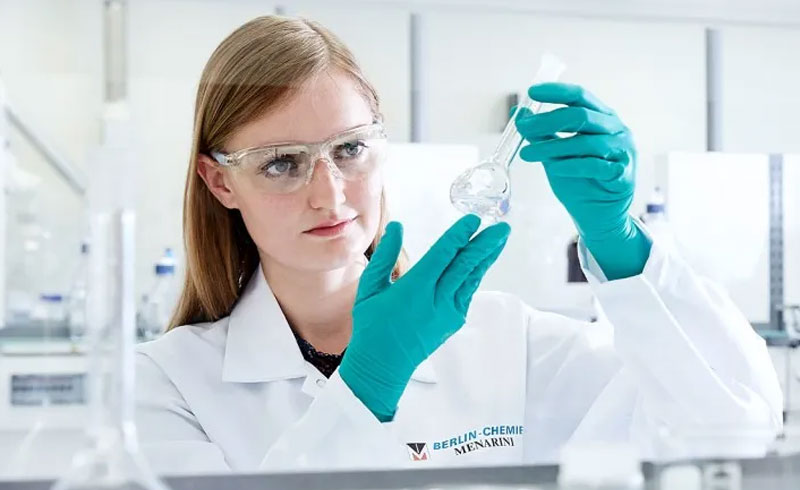
Pomezia (Italy), July 9th, 2020 – Menarini Ricerche, the R&D division of the Menarini Group, announces that it has published four abstracts presenting the latest findings related to its meropenem/vaborbactam (Vaborem™) and delafloxacin (Quofenix™) clinical studies, confirming Menarini’s commitment to fighting life-threatening bacterial infections. The findings are included in the abstract book of the ECCMID, available at https://markterfolg.de/ESCMID/Abstractbook2020.pdf.
The successful findings of the clinical studies are the result of the fruitful partnership between Menarini and Melinta Therapeutics. These findings provide important new insights into the infectious disease area related to a number of topics, including: hospital acquired bacterial pneumonia/ventilator-associated bacterial pneumonia (HABP/VABP) due to Carbapenem resistant Enterobacteriaceae (CRE); difficult-to-treat subjects with Acute Bacterial Skin and Skin-Structure Infections (ABSSSI); European patients with community acquired bacterial pneumonia (CABP); and Quofenix™ microbiological activity against clinical isolates causative of CABP.
“Every year infections related to antibiotic-resistant pathogens kill 700,000 people worldwide, of which 33,000 are in Europe”, commented Angela Capriati, Global Corporate Director of Clinical Sciences and Therapeutic Area Head, General Medicine, Menarini Ricerche. “If we don’t take concrete actions to fight against the worrying spread of antimicrobial resistance, some forecasts show that infections could kill up to 10 million people by 2050, a higher number than the people currently dying from cancer. That is why Menarini Ricerche is fully committed in bringing new treatments for difficult-to-treat and hospital acquired infections for the most fragile patients, focusing on multidrug resistant pathogens, which the World Health Organization lists as serious threats to global public health”.
Below is a summary of the findings presented in the ECCMID abstract book.
The first abstract is dedicated to Vaborem™, the first carbapenem/β-lactamase inhibitor combination, developed to selectively tackle CRE thanks to the strong activity against Class A and C serine β-lactamases1. The data reported in the abstract relies on the results of the TANGO II trial, the first pathogen-specific study addressing patients with CRE infections. In this randomized, Phase 3, open-label study, Vaborem™ was administered as monotherapy in patients with confirmed or suspected CRE infections and compared to the best available treatment, which in most cases were combinations of multiple antibiotics. Throughout the study, Vaborem™ showed a reduction in mortality and improvement in clinical cure and safety/tolerability over best available treatment, appearing to be an effective therapeutic option for HABP/VABP and bacteremia due to CRE.
The other three abstracts present data on Quofenix™, the innovative anionic fluoroquinolone antibiotic with Gram-positive/Methicillin-Resistant Staphylococcus aureus strains (MRSA), Gram-negative and atypical activity, available as IV and oral formulations.
A post hoc analysis of pooled data from Phase 3 ABSSSI trials assessed the impact of risk factors such as age, diabetic status or type of infection on the efficacy of Quofenix™ 2. The data reported in the abstract demonstrates that the number of risk factors does not affect the efficacy of Quofenix™ in ABSSSI patients, with a high success rate confirmed also in difficult-to-treat patients.
The last two abstracts refer to a recently completed global Phase 3 trial in 859 patients with CABP comparing Quofenix™ to moxifloxacin. Quofenix™ demonstrated comparable efficacy to moxifloxacin for the treatment of patients with moderate to severe CABP (PORT class III-V). Quofenix™ has FQ class warnings, but the data confirms its favourable safety and tolerability profile without the potential for QT prolongation, phototoxicity, or major drug-drug interactions3.
Additional microbiological data that demonstrates potent in vitro activity and clinical efficacy of Quofenix™ against CABP pathogens, including S. pneumoniae, MRSA, Haemophilus species, Enterobacteriaceae, P. aeruginosa, and the atypical pathogens C. pneumoniae, M. pneumoniae and L. pneumophila4 was presented in the fourth abstract.
References
- M. Bassetti, F. Menichetti, G. Daikos, S. Cammarata, K. Fusaro, D. Zinzi. Meropenem-Vaborbactam (VABOREM) in treatment of patients with hospital- and ventilator-acquired pneumonia (HABP/VABP) and bacteraemia due to carbapenem-resistant Enterobacteriaceae. (ECCMID 2020 accepted abstract 1192).
- B. Pizà Vallespir, S. Biliotti, A. Nizzardo, A. Nuti, S. Cammarata, D. Zinzi. Risk factors (derived from host, pathogen and disease) did not affect the efficacy of delafloxacin monotherapy in acute bacterial skin and skin structure infections trials. (ECCMID 2020 accepted abstract 7976).
- Alvarez-Sala, M. Popescu, L. Lawrence, S. Cammarata, D. Zinzi. Delafloxacin (DLX) in the treatment of communityacquired bacterial pneumonia (CABP): patients with PORT Risk Class III-V R. (ECCMID 2020 accepted abstract 4540).
- S. Mccurdy, L. Lawrence, S. Cammarata, A. Nuti, D. Zinzi. Analysis of the microbiological data from the delafloxacin (DLX) phase III community-acquired bacterial pneumonia (CABP) trial using European analysis sets. (ECCMID 2020 accepted abstract 3857).


















